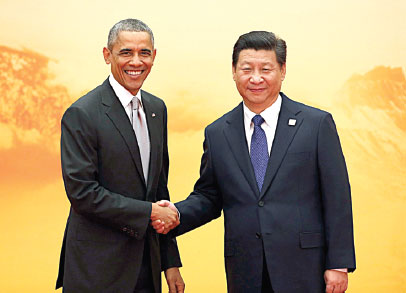New visa extension will boost US tourism
|
US President Barack Obama shakes hands with Chinese President Xi Jinping during the APEC Forum at the International Convention Center in Beijing on Tuesday. Kim Kyung-Hoon / Reuters |
A new visa extension for US and Chinese citizens is expected to boost US tourism and is being looked upon as a positive step in relations between the two super powers.
US President Barack Obama announced on Monday in Beijing that the US and China had agreed to a reciprocal 10-year visa policy for tourists and businessmen. Speaking during the Asia-Pacific Economic Cooperation (APEC) summit, Obama said the move would "benefit everyone".
It will allow citizens of each country to travel between the two countries for up to 10 years on a single visa, putting China on level footing with other major trade partners like Brazil and several European countries. Travelers and students can currently receive one-year visas. Students will also now be able to obtain five-year visas. The visa extensions will start on Wednesday.
The change is expected to be a boon for the US economy, creating up to 440,000 American jobs by 2021 because increased tourism and business spurred by visits from more than 7 million Chinese would generate nearly $85 billion in revenue, according to a White House estimate.
Last year 1.8 million Chinese travelers visited the US, contributing $21.1 billion to the economy and supporting more than 109,000 American jobs, according to a White House estimate.
The tourism industry accounted for 2.8 percent of US GDP and nearly 70 million international tourists spent $166 billion in the US in 2012, according to the US Commerce Department's International Trade Administration.
"Where this will make the most impact is on the repeat traveler to the US from China," said Evan Saunders, CEO of Attract China, a Boston and Beijing consultant that helps US businesses attract Chinese tourists.
He said many Chinese visitors who want to make multiple visits to the US won't have to go through what can be a time-consuming process of renewing a visa every year.
"By 2018, Chinese tourists are expected to be the top overseas traveler to the US," Saunders told China Daily.
What do US businesses have to do to take advantage of the projected influx of tourists?
"US businesses need to utilize the Internet and social media to engage the Chinese consumer," said Saunders. "And they need to do it about six months before the Chinese tourist departs for the US."
In 2012, Obama issued an executive order to ease the issuance of visas to visiting Chinese and to speed up the visa request process at China's US consulates.
"This convinced hundreds of thousands of Chinese visitors to choose the US as a leisure and shopping destination and knowing that an average Chinese visitor to the US spends an average of $7,000 per trip, the impact on the US economy could be measured in additional billions," said Pierre Gervois, CEO and publisher of China Elite Focus Magazines.
The visa extension will bring explosive growth to the tourism industry, said Ralph Zhu, marketing director of US International Trip, a California-based travel agency which expects 300,000 customers from China this year.
"The biggest growth may come from Chinese students studying in the US," he said, "A student may spend three or four years in the United States. Under the new visa policy, their family and friends won't worry about renewing their visas and therefore are more likely to visit them every year."
The Chinese account for about 28 percent of the foreign students studying in the US according to the Institute of International Education's Open Door report.
The basic visa processing fee will remain the same, according to the US State Department.
Obama arrived in Beijing earlier for a week-long trip to the region and the APEC summit. Later he is scheduled for a state visit with Xi.
"The fact that President Obama announced these changes with what he termed the strong approval of Chinese President Xi Jinping at a major multi-lateral event like the APEC summit is a positive step," Kenneth Lieberthal, senior fellow in foreign policy at the Washington-based Brookings Institution told China Daily.
Lu Huiquan in New York contributed to this report.
paulwelitzkin@chinadailyusa.com



















